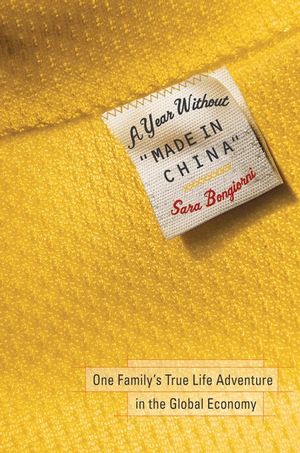I spotted
A Year Without Made in China by Sara Bongiorni while browsing at the library. It immediately caught my interest as another pick to help satisfy the green/sustainable/simple living kick I've been on for months now.
Bongiorni is a journalist, so it comes as no surprise that her writing style is enjoyable, humorous, and easy to read. I took the book home and quickly starting flying through the pages.
The concept is pretty simple. After seeing how many gifts and items in her home come from China during one holiday season, Bongiorni decides to kick the Made in China habit and on January 1, 2005 starts a year-long experiment to not purchase any items that are made in China. The main goal of the experiment isn't really to make a political statement, but rather to see if it can be done.
There are some caveats, of course. Gifts, trash and hand-me-downs are an exception to the made in China rule. Nor is the author going to rid her life of previously purchased Chinese goods; the project applies only to future purchases. All of which makes total sense.
Anyone who notices the "made in" labels on products will know this won't be an easy undertaking. China has the market in electronics, toys, and cheap crap in general entirely corned. It isn't long into the first chapter when the first purchase trouble strikes as the author's husband tries to find pegboard hooks so he can organize his workshop. But, alas, all the hooks are made in China. The next troublesome purchase slash mini project is when the author's son outgrows his shoes. Apparently China has the market cornered on shoes too. So the author details her exhausting search for a new, non-Chinese pair, which takes two weeks.
We make it until page 34 until the project starts to really wear on the author's three-year-old son. He wants a new, Chinese of course, game, but Bongiorni manages to distract him with the toys they already own. But on the very next page, after a weekend filled with the zoo and the circus, there is another toy standoff. This one is over a $15 plastic sword for sale at the circus. This time she says her son can buy the sword with his own money, or he can skip it, save his money, and she will buy him a new, non-Chinese toy.
I think it was around chapter four that the project began to wear on
me. The books feels like it devolves into a chronicle of one purchase after another and the struggles to make sure those purchases are China-free. Many of these purchases are toys. In fact, it may have been the author's standoff with her husband over their "need" to buy their kids a new plastic pool for the summer that made me question their project entirely. What is the value of not purchasing items from China over, say, just making a few less purchases. What difference does it really make if one buys more plastic crap from Taiwan and less from China?
At this point, my reading speed slowed considerably. The book lingered on the shelf as I started and finished first one, then two other books. The family's purchases start to become more grating. Why are their choices to either break their rules and buy Chinese holiday decorations, or go without decorating altogether? Haven't they decorated in the past and, if so, couldn't they simply reuse those items? Or could they make their own decorations? Using a bit of creativity outside of shopping skills might have helped them make it through the project and make for a better book.
In fact I only finished this book in order to be able to write a review and return it to the library before the due date (after many renewals, natch).
In summary,
A Year Without Made in China isn't a book I can recommend. Even if you're just borrowing it from the library, I would leave this one on the shelf. Sorry, Sara.
Rating: 2.0/5.0












